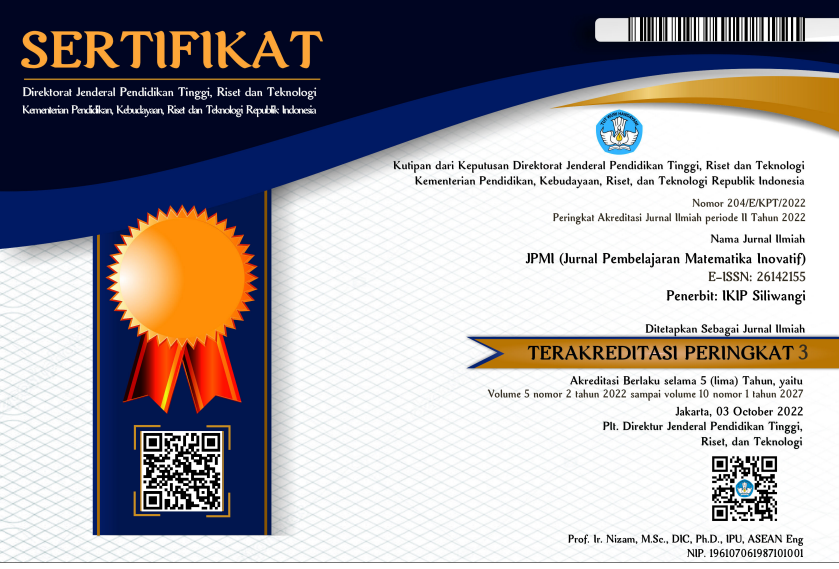ANALISIS KEMAMPUAN REPRESENTASI MATEMATIS DITINJAU DARI KEMAMPUAN METAKOGNITIF
DOI:
https://doi.org/10.22460/jpmi.v6i3.17105Keywords:
Mathematical representation ability, Metacognitive, PhenomonologyAbstract
References
Ansory, I., Sugiatno, & Bistari. (2019). Kemampuan representasi matematis dalam menyelesaikan soal fungsi kuadrat dikaji dari metakognisi siswa SMA. Jurnal Pendidikan Dan Pembelajaran Khatulistiwa, 8(9), 1–8.
Barzilai, S., & Ka’adan, I. (2017). Learning to integrate divergent information sources: the interplay of epistemic cognition and epistemic metacognition. Metacognition and Learning, 12(2), 193–232. https://doi.org/10.1007/s11409-016-9165-7
Creswell, J. W., & Creswell, J. D. (2018). Research design: qualitative, quantitative and mixed methods approaches (5th ed.). SAGE Publications, Inc.
Fitri, N., Munzir, S., & Duskri, M. (2017). Meningkatkan kemampuan representasi matematis melalui penerapan model problem based learning. Jurnal Didaktik Matematika, 4(1), 59–67. https://doi.org/10.24815/jdm.v4i1.6902
Flavell, J. H., Miller, P. H., & Miller, S. A. (2002). Cognitive developement (4th ed.). Pearson Education, In.
Herlina, Yusmin, E., & Nursangaji, A. (2017). Kemampuan representasi matematis siswa dalam materi fungsi di kelas VIII SMP Bumi Khatulistiwa. Jurnal Pendidikan Dan Pembelajaran Khatulistiwa, 6(10), 1–9.
Hutauruk, A. J. . (2016). Pendekatan metakognitif dalam pembelajaran matematika. Prosiding Seminar Nasional Matematika Dan Pendidikan Matematika, 176–190.
Lestari, K. E., & Yudhanegara, M. R. (2015). Penelitian pendidikan matematika. PT Refika Aditama.
Mastuti, A. G. (2017). Representasi siswa sekolah dasar dalam pemahaman konsep pecahan. Jurnal Matematika Dan Pembelajaran, 5(2), 193–208.
Mathematics, N. C. of T. of. (2000). Principles and standards for scholl mathematics. The National Council of Teachers of Mathematics, Inc.
S, D. S. (2018). Pengaruh pendekatan scientific terhadap kemampuan metakognisi peserta didik pada pembelajaran agama islam di SMA 1 Barru. UIN Alauddin Makassar.
Sugiyono. (2013). Metode penelitian kuantitatif, kualitatif, dan R&D. Alfabeta.
Syafri, F. S. (2017). Kemampuan representasi matematis dan kemampuan pembuktian matematika. Jurnal Edumath, 3(1), 49–55.
Villegas, J. L., Castro, E., & Gutiérrez, J. (2009). Representations in Problem Solving: a case study with optimization problems. Electronic Journal of Research in Educational Psychology, 7(1), 279–308.
Wood, L. N., Petocz, P., & Reid, A. (2012). Becoming a Mathematician: An international perspective. Springer.
Wulandari, S. D. (2019). Profil representasi matematis siswa dalam menyelesaikan masalah matematika dengan media screencast o matic. Journal of Mathematics Education and Science, 2(2), 83–87.
Zulfikar, R. N. (2019). Pengaruh pendekatan metakognitif terhadap kemampuan representasi siswa dalam pembelajaran matematika SMK Kesehatan Nusantara Kupang. Jurnal Inovasi Matematika, 1(2), 91–98. https://doi.org/10.35438/inomatika.v1i2.153

















